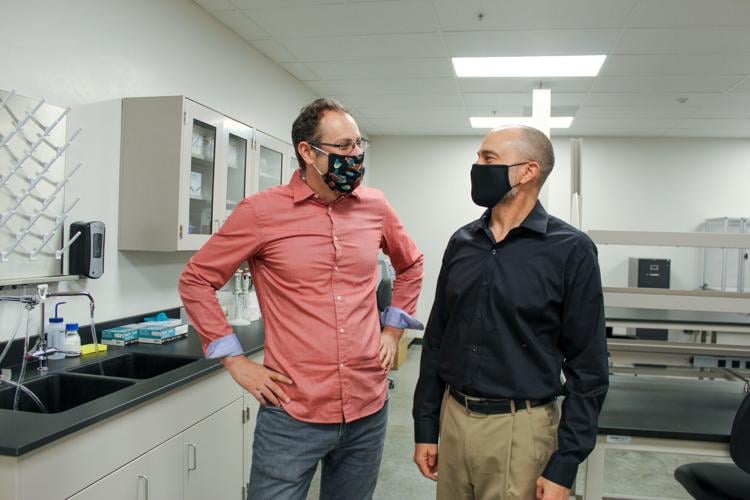People love their dogs — their dogs’ breath, sometimes not so much.
Now, technology developed at the University of Arizona may help fight the scourge of canine halitosis.
A startup company co-founded by UA faculty members is trying to take to market a type of engineered bacteria that can be added to dog treats to keep Fido’s breath minty fresh for hours.
The company, uPetsia, licensed the patent-pending technology from the UA and is being incubated at the University of Arizona Center for Innovation, after recently winning a year’s admission to the center in a competition sponsored by the Oro Valley Chamber of Commerce.
The underlying technology was developed at the University of Arizona College of Agriculture and Life Sciences and BIO5 Institute by Eric Lyons and David Baltrus, both associate professors of plant sciences, and Scott Zentack, an MBA with a background in finance and product development.
Lyons got the idea for a product to improve animal breath at a Thanksgiving dinner, where family members and friends began comparing their dogs’ bad breath.
“It’s a such a simple story, and everyone grabs onto it,” said Zentack, who became friends with Lyons through their common passion for pinball.
Thinking there might be a biological solution to the problem of doggie death breath, Lyons enlisted colleague Baltrus to refine the idea.
Zentack jumped aboard after taking time off from his career a few years ago to raise his family in Tucson.
The founders began experimenting, taking mouth swabs of 10 dogs owned by family members. From some 400 variations of benign bacteria they isolated about 20 bacteria that could be safely modified, he said.
The scientists finally engineered a single bacteria that can produce methyl salicylate — the chemical made by wintergreen plants that creates a “minty” aroma – for up to two hours.
That’s a big improvement over commercial dog breath sprays that can last only minutes, but Zentack said the company is working to develop a much longer-lasting additive.
“While the product works, we would like to get the persistence of the bacteria, the time it lasts, to be six to eight hours,” said Zentack, uPetsia’s CEO since its founding in July 2020.
uPetsia worked with Tech Launch Arizona, the UA’s technology commercialization arm, to refine and protect their invention with patent filings.
The founders went through the I-Corps program at Tech Launch Arizona, a National Science Foundation-sponsored program to help entrepreneurs discover their customers and assess the commercial viability of their technologies.
uPetsia — which rhymes with “You betcha” — worked with a board that oversees animal safety at the UA and won an asset-development grant from Tech Launch Arizona to develop a prototype product, before applying for the UACI sponsored launch program in Oro Valley, Zentack said.
uPetsia is the second member of the UA Center for Innovation at Oro Valley, one of several branch incubators of the UACI, which is based at the UA Science and Technology Park on South Rita Road.
In November, TheraCea Pharma, a UA technology spinoff developing new contrast agents for positron emission tomography (PET) scans, won membership at the Oro Valley UACI branch in a competition sponsored by the BioIndustry Association of Southern Arizona.
Zentack, who holds an engineering degree from Virginia Tech and an MBA from the University of Texas, said the office space and wet labs at the new UACI-Oro Valley, at 1800 E. Innovation Park Drive, will prove invaluable.
The company will be working over the next six months to a year with various partners to optimize and scale up its technology, he said, noting that the company is in the process of hiring a lab director.
uPetsia isn’t looking to create its own doggie breath-freshening products, but instead is looking to sell its formulations to manufacturers of doggie treats for use as additives in their products, said Zentack.
There is still much work to be done, including testing to prove the safety and efficacy of the final product to state and federal regulators, he noted.
In the future, the technology could easily be adapted to cats — and perhaps two-legged critters, Zentack said.
“We’re confident we could take this technology to cats, and possibly much farther down the line, products for humans… imagine a breath mint or gum that instead of lasting a half hour lasts for hours,” he said, noting that the regulatory hurdles for a human product would likely be much higher.
The market potential is huge, Zentack said, noting that sales of dog and cat food and treats are worth some $36 billion annually, with the market for dental treats alone estimated at $1.8 billion.
“The market’s there, it’s large, and we just had a bump with COVID (pet) adoptions because people were staying at home,” he said.
Eric Smith, executive director of UACI, cited the broad potential uPetsia has in the marketplace.
“uPetsia is passionate about bringing their product to pets everywhere,” Smith said. “This technology has the potential to be in households across the world and we are here to support that growth trajectory.”
The Oro Valley Chamber, which funded the UACI sponsored launch valued at $10,000, also gave uPetsia membership in the Chamber, providing access to its events, exclusive deals and connections to a network of local businesses.
Chamber President and CEO Dave Perry said the group is excited to add another bioscience startup in Oro Valley, where about 1,800 people work at Roche Diagnostics just north of the UACI branch.
The Roche operation started as UA technology spinoff Ventana Medical Systems in the 1980s and was acquired by Roche in 2008 in a deal worth $3.4 billion.
“We see the economic benefit of nurturing businesses that can become employers in our community,” Perry said. “We want to grow Oro Valley’s reputation as a bioscience hub.”





